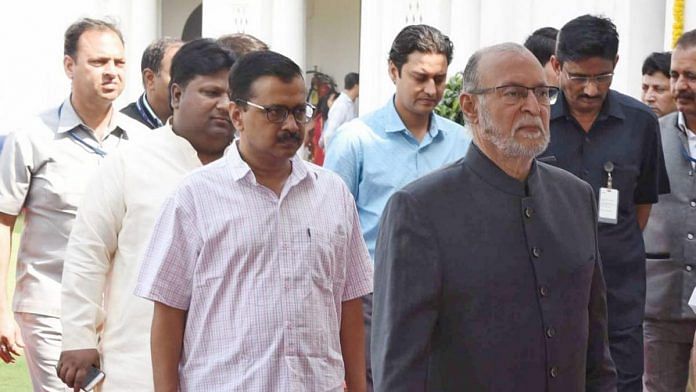New Delhi: The Supreme Court Thursday failed to settle the long-running dispute between the Centre and Delhi over the control of Services in the national capital territory.
In a major setback to the Arvind Kejriwal-led Aam Aadmi Party (AAP) government, the court also decided that Anti-Corruption Bureau (ACB) will be under the Lieutenant Governor (LG), and by extension, the Centre.
The two judges on the bench, which had reserved its verdict on 1 November, delivered separate judgments, differing on the crucial issue of who can transfer and post officers, especially those of the rank of joint secretary and above in Delhi.
Justice A.K. Sikri held that under the current Constitutional scheme, the Services as well as the ACB fell within the purview of the L-G, which effectively means that the Centre, and not the state government, will control the Services.
However, Justice Ashok Bhushan, while agreeing with Sikri on a majority of the issues, differed with him on the subject of powers of the state government to transfer and post officers.
Of the other four issues before the bench, both the judges were of the view that the electricity board and the power of revision of minimum rates of agriculture land will be under the NCT of Delhi. However, the L-G would have the power to refer the issue to the President for adjudication in case he doesn’t agree with the proposal of the Government of NCT.
On the issue of appointing Special Public Prosecutor (SPP), the bench ruled that the power lies with the government of NCT.
Since the two judges couldn’t agree on the most contentious issue, the matter will now be placed before a third judge for adjudication.
Delhi Chief Minister Arvind Kejriwal and L-Gs Anil Baijal and his predecessor Najeeb Jung have been embroiled in a turf war since the AAP came to power in 2015. Kejriwal has maintained that the L-Gs have been hindering the functioning of the state government at the behest of the Bharatiya Janata Party-led Centre.
Also read: L-G has no independent decision-making power: Extracts from SC ruling on Delhi’s power tussle
Long tussle
The clutch of petitions, most of them having their genesis in the continued power struggle between the L-G — appointed by the Modi government — and the Kejriwal government, asked the court to clarify who had control over the Services and the ACB.
The power-tussle between the Centre and the state also included control of the Anti-Corruption Bureau.
A five-judge constitution bench had ruled in July last year that the L-G of Delhi is bound to hear the aid and advice of Delhi’s council of ministers and cannot act like an “obstructionist”.
The July judgment ended the three-year-long turf war in a verdict over a plea filed by the AAP-led state government that challenged a Delhi High Court ruling that L-G was the ‘administrative head’ of Delhi.
The apex court didn’t set aside the HC judgment, but reminded the L-G of his duties and outlined the scope of his role in the administration of the national capital.
What the Centre said
In its submissions, the Modi government told the apex court that the L-G had the power to regulate services in the state of Delhi. It added that unless the President of India specifically said otherwise, the L-G, who is Delhi’s administrator, did not need to consult the chief minister or the council of ministers.
The central government also emphasised that by virtue of being the country’s capital, the administration of Delhi could not be left to the state government.
“Delhi has an extraordinary position as it is the capital of the country,” the Centre submitted.
It further reminded the top court that a five-judge constitution bench had categorically ruled that Delhi could not be accorded statehood.
The AAP moved the top court in October last year for clarification relating to the governance of the state in light of the 4 July 2018 judgment. It wanted the related petitions to be heard soon to end the “stalemate” in the administration of the state.
Also read: Supreme Court hands AAP a victory, says L-G must work harmoniously with Kejriwal govt




I personally feel statehood can and should be granted to Delhi. In the past, the BJP itself has promised this in its Manifesto. None of the arguments made against this proposition holds compelling force. However, even if that does not happen and different parties are in power at the Centre and in the state, the highest possible respect should be accorded to the democratically elected CM and his team. The LG, even upin respect of powers reserved for the Union Government, should consult the CM and overrule him in the rarest of rare circumstances. AAP’s remarkable 67 / 70 mandate has not been respected. Not sure if the people of Delhi are pleased with this situation.